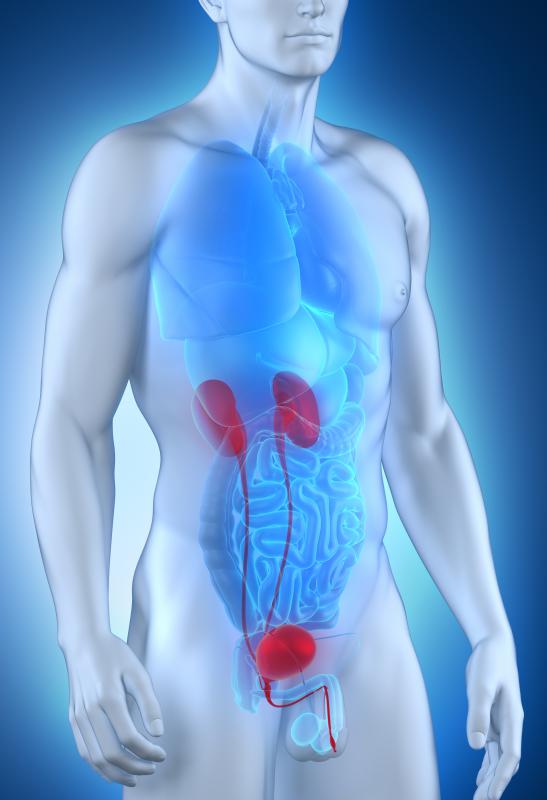At TheHealthBoard, we're committed to delivering accurate, trustworthy information. Our expert-authored content is rigorously fact-checked and sourced from credible authorities. Discover how we uphold the highest standards in providing you with reliable knowledge.
What Are the Different Causes of Metabolic Alkalosis?
Metabolic alkalosis is a condition in which the balance of acids and bases in the body is off, and it is characterized by an increased blood pH level and an increased blood bicarbonate level. One of the causes of metabolic alkalosis is loss of fluid from the body, either from vomiting or other means. Endocrinologic abnormalities, including conditions known as Cushing's syndrome and Conn's disease, can cause this condition. Other causes can include electrolyte abnormalities and licorice ingestion. Determining the cause of the metabolic alkalosis in a given patient relies on obtaining a detailed history and interpreting different laboratory studies.
Conditions in which the body loses fluid can be causes of metabolic alkalosis. By vomiting, patients lose the acidic fluid typically found in the stomach, and this can shift them into an alkalotic state. Similarly, loss of the stomach fluids from the use of a nasogastric tube that empties the contents of the stomach can also cause alkalosis. The use of diuretics — medications that increase the production of urine — can decrease the body’s blood volume and cause an effective increase in the concentration of bicarbonate in the blood, leading to a metabolic alkalosis.

Another one of the causes of metabolic alkalosis is disorders of the endocrine system. Elevated levels of the hormones aldosterone or cortisol can lead to increased renal excretion of hydrogen ions, which are acidic, therefore leading to an alkalosis. Patients with these conditions also typically have elevated blood pressure. When patients have a narrowing of the blood vessel leading to the kidney, they can develop a similar picture because this condition causes increased levels of aldosterone in the body.

There are a number of other causes of metabolic alkalosis. Having low levels of magnesium or potassium in the blood can lead to this condition. A rare inherited disorder that affects the function of the kidney, known as Bartter’s syndrome, is another cause. Excess ingestion of licorice can also cause metabolic alkalosis.
Determining which of the causes of metabolic alkalosis is present in a given patient involves eliciting a complete medical history and interpreting a number of laboratory studies. The patient’s recent history, including medication use and symptoms experienced, is often very helpful in making a diagnosis. Checking the concentration of chloride in the urine also helps to distinguish between different causes of metabolic alkalosis. Patients with low urine chloride are likely to have a condition in which the body is losing fluid. High urine chloride points to a disorder of the endocrine system.
AS FEATURED ON:
AS FEATURED ON:















Discussion Comments
I had metabolic alkalosis once due to food poisoning. I had vomiting and diarrhea for an entire night and didn't go to the hospital until morning. By the time I got to the ER, my blood pressure was low, I had irregular heartbeat and I was confused. I was also dehydrated. I had to be given an IV serum with potassium, antibiotics and a heart medication to normalize my blood pressure.
The doctor said that I should have gone to the hospital much sooner because it could have been worse. Apparently, if metabolic alkalosis isn't treated soon, it can even cause coma.
I was in the hospital the whole day and I had to rest at home for another three days to feel better.
@turkay1-- Yes, they can because some high blood pressure medications are diuretic. Like the article described, diuretics can cause metabolic alkalosis.
Of course, not all diuretics work the same way, so not all diuretics have the risk of alkalosis. If I remember correctly, the risk is more with loop diuretics because they reduce the amount of sodium and potassium in the blood.
If you're not sure, ask your doctor about the specific medication you're using. It's also a good idea to be familiar with the symptoms of metabolic alkalosis so that you can identify them if they show up.
Can blood pressure medications cause metabolic alkalosis?
Post your comments